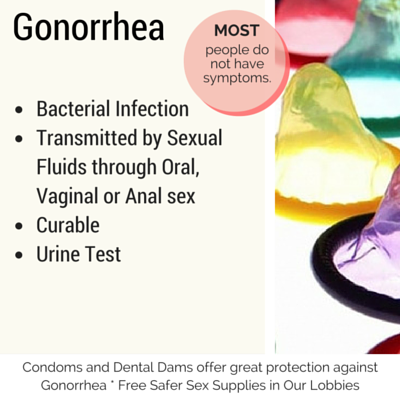Gonorrhea

Gonorrhea
Gonorrhea is one type of Sexually Transmitted Infection (STI) that is caused by bacteria called Neisseria gonorrhoeae . Any gender can contract it by having sex (vaginal, oral, or anal) with someone who has the infection. In women and transmen, gonorrhea can enter the anus not only during anal sex but also if infected vaginal secretions are carried toward the anus. Once a person has gonorrhea they can infect another part of their own body.
Symptoms
About 80% of the women and trans men with gonorrhea have no symptoms.
Some women and trans*folks experience symptoms when they have gonorrhea of the cervix:
- Greenish-yellow discharge of pus from the vagina or cervix;
- Burning with urination
- Mushroom-like odor from the genital area
- Lower back pain or abdominal pain.
- Gonorrhea of the throat may be characterized by a sore throat.
- Gonorrhea of the anus includes a mucous dischage from the anus or itching in that area.
Men may also have no symptoms, but usually they notice:
- Burning while urinating
- A clear or creamy discharge from the penis that can be white, yellow or yellowish-green.
- A male's lymph nodes in the groin may be slightly swollen and tender.
Because people often have no symptoms, a person can unknowingly infect their partner. If your partner is being treated for gonorrhea, you should be treated at the same time.
What Are The Health Problems Associated With Gonorrhea?
- If untreated, gonorrhea can develop into a more complicated infection.
- In women and transmen it can cause Pelvic Inflammatory Disease, PID, when the infection spreads from the cervix to the lining of the uterus and the Fallopian tubes and thus causing scar tissue.
- Symptoms of PID include lower abdominal pain, pain with intercourse, pain during menstruation and irregular periods. The scarring of the tubes can possibly cause infertility and put a woman at higher risk for developing an ectopic pregnancy (a pregnancy that implants outside of the uterus).
- A woman or transman can transmit gonorrhea to their infant during birth. This can cause an eye infection or, if left untreated, blindness for the newborn.
Confidential Testing
Get tested for Gonorrhea at any WHS clinic. We test people of all genders. The test for gonorrhea is a simple urine test.
If you have been exposed to gonorrhea, it takes from two to ten days for possible symptoms to develop, or for a gonorrhea test to have a positive result.
Treatment
If you are diagnosed as having gonorrhea, your sexual partners(s) should be treated as well. You are at risk to be re-infected without treating sexual partners or using condoms.
Gonorrhea is treated with antibiotics prescribed by your provider. It's a good idea to have a follow-up culture after treatment.
Using condoms and barrier methods of birth control (diaphragm, cervical cap) is an excellent way to reduce the chance of getting gonorrhea. Women who use Birth Control Pills or use an IUD are more susceptible to contracting gonorrhea, unless they use a male or female condom.
Test Your Knowledge
1. True or False: A person of any gender can give gonorrhea to a person of any gender.
2. True or False: Condoms are a HIGHLY effective way to prevent the transmission of gonorrhea.
3. True or False: The infection rate is highest in people under 25.
4. True or False: If you're have anal, vaginal or oral sex, the only way to know if you've been exposed is to get tested.
5. True or False: Most people will have a sexually transmitted infection during the course of their lifetime.
All True!